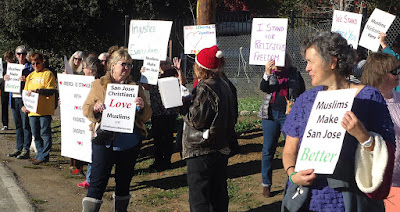What a difference a hate
mail can make!
On the day before
Thanksgiving, Wednesday, November 23, the Evergreen Islamic Center (EIC) in San
Jose, CA, received a hate mail that set off a chain of events that not only diminished
the haters but in the most moving and celebratory way, reaffirmed our faith in
America. I have written about the overwhelming support we received from our
fellow-Americans from near and far in an article in the San Jose Mercury News,
so I will not repeat the details here.
What I want to focus on is
the gathering of over 400 Americans at EIC on Sunday, December 11 – Jews,
Christians, Buddhists, Hindus, Jains, atheists and, of course, Muslims - to denounce hate and Islamophobia and express
solidarity with us.
Speaker after speaker
invited the writer(s) of the hate letter to meet Muslims and overcome their
prejudice against a minority of Americans (about 3 million in a population of about
330 million Americans). Rabbis, priests, reverends, clergies, young and old
took to the stage to invite Americans to celebrate our common humanity. “There is
enough love to go around,” declared the president of EIC, and so true it was!
Supervisor Dave Cortese
reminded the gathering that San Jose was one of six metropolitan areas of the
world lauded and emulated for its religious harmony. Mayor Sam Liccardo
reiterated his vow to make San Jose a sanctuary city for undocumented workers
and students if Donald Trump’s government attempted to deport them.
 |
| Symbol of support from Shira Goldman of Tarzana, CA |
Imam Tahir Anwar quoted
Martin Luther King, Jr: “The ultimate measure of a man is not where he stands
in moments of comfort and convenience, but where he stands at times of
challenge and controversy.”
That 400 people of different faiths had given up
the leisurely pleasures of a Sunday afternoon to travel to EIC and spread the message
of love was a testament to the greatness of ordinary Americans.
Perhaps the most moving
remarks came from Reverend Kiley of the Silicon Valley Faith Group who said, “I
see the tapestry of this community with deep belief in love.” He then quoted a
poem by Edwin Markham:
He
drew a circle that shut me out-
Heretic, rebel, a thing to flout.
But love and I had the wit to win:
We drew a circle and took him in!
Heretic, rebel, a thing to flout.
But love and I had the wit to win:
We drew a circle and took him in!
The year 2016 will go down
as one of the most traumatic in history. The plight of refugees, the deaths of
innocents, the accelerating pace of global warming, all capped by the election
of an unexpected and unpredictable candidate to the highest office in America
has put most of us on edge.
But despair is the hallmark of the weak. It is in
our power – ordinary Americans driven by a sense of duty, responsibility and
love – to overcome policies that challenge our bedrock values. Things will not fall apart; the center will hold for it is the best among us who are full of
passionate intensity while the worst lack all conviction.
Paraphrasing the Beatles: Take
a sad year and make it better.























